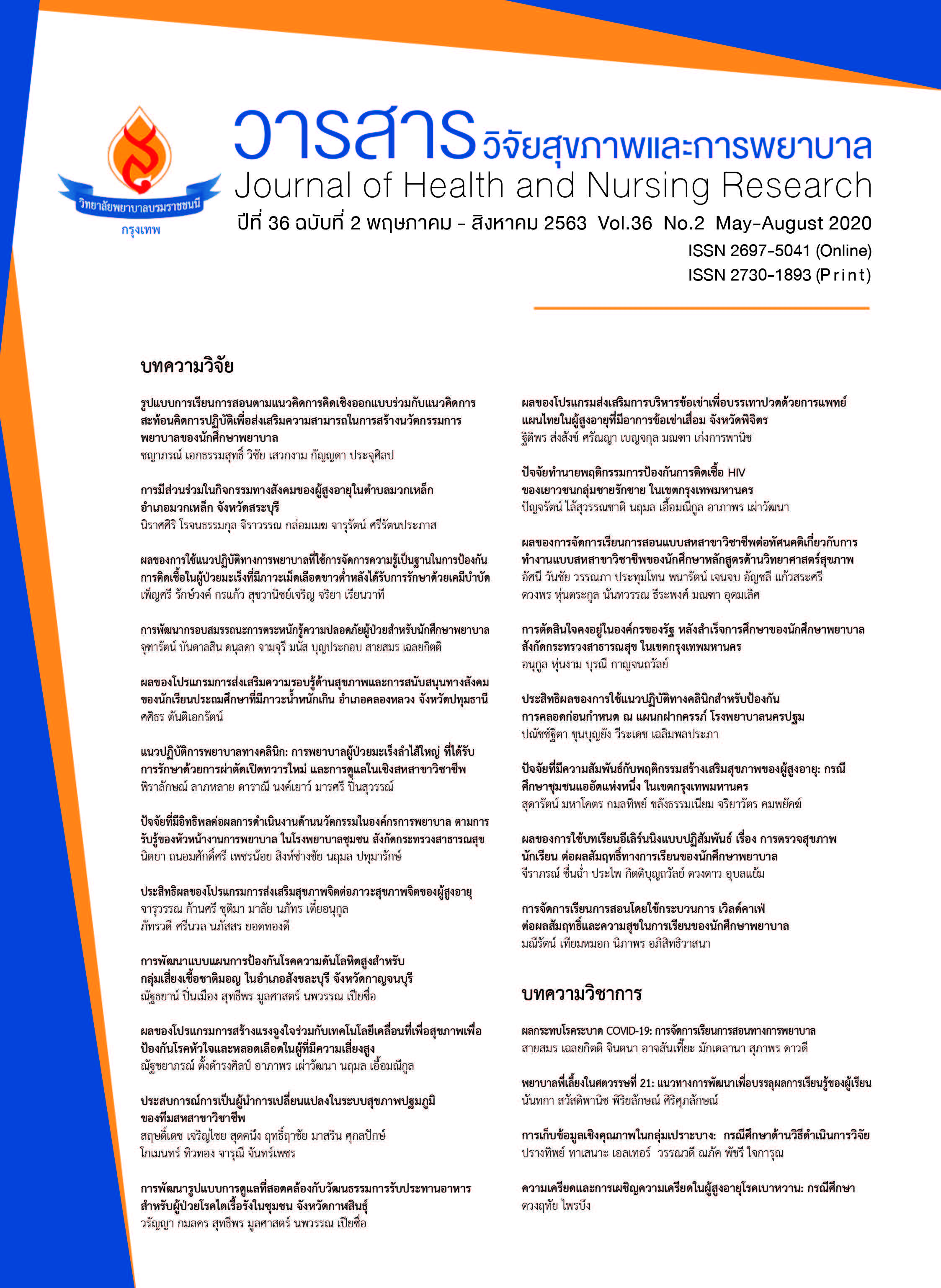ประสิทธิผลของโปรแกรมการส่งเสริมสุขภาพจิตต่อภาวะสุขภาพจิตของผู้สูงอายุ
คำสำคัญ:
ส่งเสริมสุขภาพจิต, ผู้สูงอายุบทคัดย่อ
ผู้สูงอายุมีความเสี่ยงต่อการเกิดปัญหาสุขภาพจิตมากที่สุด การส่งเสริมสุขภาพจิตเป็นแนวคิดที่สามารถลดความเสี่ยงดังกล่าวได้ การวิจัยครั้งนี้เป็นการวิจัยกึ่งทดลอง มีวัตถุประสงค์เพื่อศึกษาผลของโปรแกรมส่งเสริมสุขภาพจิตต่อภาวะสุขภาพจิตของผู้สูงอายุ กลุ่มตัวอย่างคือผู้สูงอายุที่มีอายุเกิน 60 ปีบริบูรณ์ขึ้นไปและมีคุณสมบัติตามเกณฑ์ที่กำหนดคือ 1) ช่วยเหลือตนเองได้ดี 2) ไม่เป็นโรคติดต่อร้ายแรงหรือความพิการด้านการเคลื่อนไหว 3) ยินดีและเต็มใจให้ความร่วมมือในการวิจัย 4) สามารถติดต่อสื่อสาร อ่านและเขียนภาษาไทยได้ จำนวน 60 คน ทำการสุ่มตัวอย่างอย่างง่าย แบ่งเป็นกลุ่มทดลองและกลุ่มควบคุมกลุ่มละ 30 คน กลุ่มทดลองได้รับโปรแกรมส่งเสริมสุขภาพจิตโดยประยุกต์แนวคิดของการสร้างสุขจากหลักธรรมะผสมผสานกับแนวคิดการสร้างสุขเชิงจิตวิทยาและแนวคิดในการดูแลสุขภาพผู้สูงอายุแบบองค์รวม ประกอบด้วย 8 กิจกรรม จำนวน 8 ครั้งละ 90 นาที ดำเนินกิจกรรมสัปดาห์ละ 1 ครั้ง ติดต่อกัน 8 สัปดาห์และกลุ่มควบคุมได้รับการดูแลปกติ วิเคราะห์ข้อมูลทั่วไปโดยใช้สถิติพรรณนาเปรียบเทียบคะแนนเฉลี่ยภาวะสุขภาพจิตของผู้สูงอายุในกลุ่มทดลอง ก่อนและหลังการทดลองด้วยสถิติทดสอบค่าที (t-test)
ผลการวิจัยพบว่า
1) ค่าเฉลี่ยคะแนนภาวะสุขภาพจิตของผู้สูงอายุของกลุ่มทดลองที่ได้รับโปรแกรมส่งเสริมสุขภาพจิตภายหลังการทดลอง (Mean=167.40, SD. =13.09) สูงกว่าก่อนทดลอง (Mean =154.40, SD=14.13) อย่างมีนัยสำคัญทางสถิติที่ระดับ .001
2) ผลต่างของค่าเฉลี่ยคะแนนภาวะสุขภาพจิตของผู้สูงอายุระหว่างก่อนและหลังได้รับโปรแกรมส่งเสริมสุขภาพจิตของกลุ่มทดลอง (=13.54, SD=13.80) สูงกว่ากลุ่มควบคุม (=2.17, SD=1.04) อย่างมีนัยสำคัญทางสถิติที่ระดับ .001
จากผลการศึกษาครั้งนี้แสดงให้เห็นว่าโปรแกรมส่งเสริมสุขภาพจิต สามารถส่งเสริมภาวะสุขภาพจิตของผู้สูงอายุได้ แต่ควรมีการศึกษาติดตามระยะยาว เพื่อประเมินผลการคงอยู่ของภาวะสุขภาพจิตผู้สูงอายุ
Downloads
เอกสารอ้างอิง
2. Suphawat W, Siriwattanamethanon J, Hanbunhim P. Mental health of the elderly. J of Nurses Association of Thailand Northeastern Division 2009;27(1):27-35. (in Thai).
3. National Statistical Office. Summary of important findings, Thai mental health survey 2008-2010. [Internet]. 2011[Cited 2019 Mar 16]; Available from: http://www.service.nso.go.th/nso.nsopublish
4. Kamble SV, Ghodke YD, Dhumale GB, Goyal RC, Avchat SS. Mental health status of elderly persons in rural area of India. Indian J of Basic & Applied Medical Research 2012;1(4):309-12.
5. Nakwijit B. Psycho-social factors related to self-care behavior and happiness of the senior citizen club members in the hospitals under medical service department, Bangkok metropolis. [Master Thesis]. [Bangkok]: Srinakarinwirot University; 2008. (in Thai).
6. Choorat, W., Sawangdee, Y., & Arunraksombat, S. Factors influencing the risk of having mental health problems of Thai elderly. Thai Population J 2012;6(2):87-92. (in Thai)
7. Thammacharoen W. Influence of external factors and internal factors on the happiness of the elderly. [Master Thesis]. [Bangkok]: National Institute of Development Administration; 2012. (in Thai).
8. Somsri C, Mokmoon P. The effect of 5-dimensional happiness on the elderly in Nakhonphanom hospital. Nakhonphanom Hospital J 2017;3(2):3-14. (in Thai).9. Sutthilet P. A synthesis of research on mental health promotion in older adults [Master Thesis]. [Bangkok]: Mahidol University; 2008. (in Thai).
8. Khunaporn PP. (Por. Payutto). The current trend for life and society. Bangkok: Dharma Council; 2008. (in Thai).
9. Benjaphonpitak A, Wanitcharom K, Phanuwatsuk P. The 5-dimensional happiness guide In the elderly. 1st ed. Nonthaburi: Bureau of mental health development of mental health; 2012. (in Thai).
10. Petburi P, Somprasert C, Othaganont P. The effect of a social support program on the mental health of the elderly. J of Nursing and Health Care 2017;35(22):188-97.
11 Gray R.J, Grove KS., Burns N. The practice of nursing research: appraisal, synthesis, and generation of evidence. 7th Ed. st. Louis; Elswvier Saunders; 2013.
12 Mongkol A, Vongpiromsan Y, Tangseree T, Huttapanom W, Romsai P, Chutha W. The development and testing of Thai mental health Indicator version 2007. J Psychiatric Assoc Thailand. 2009;54(3): 299-316.
13 Thoits PA. Mechanisms linking social ties and support to physical and mental health. J of Health and Social Behavior 2011;52(1):145-61.
14 Hazer O, Boylu AA. The examination of the factors affecting the feeling of loneliness of the elderly. Procedia-Social and Behavioral Sciences 2010;9(0):2083-89.
15 Chonlakorn S, Thippawan S. Self-acceptance, family relationship, community participation and quality of life of the elderly at Dindaeng housing community in Bangkok metropolitan. J of Soc Sci & Hum 20131;39(2):80-94.
16 Sota J. Concepts theories and application for health behavioral development. Khonkean: Khonkean University Printing House; 2011. (in Thai).
17. Karnchanasubsin T. The 5 Dimensions of Happiness program of Department of Mental Health that affects elders' mental health At Phochai Sub District, Wapi Pathum District, Mahasarakham Province. Buriram Rajabhat University; 2019. (in Thai).
ดาวน์โหลด
เผยแพร่แล้ว
รูปแบบการอ้างอิง
ฉบับ
ประเภทบทความ
สัญญาอนุญาต
บทความที่ได้รับการตีพิมพ์ เป็นลิขสิทธิ์ของวารสารวิจัยสุขภาพและการพยาบาล (วิทยาลัยพยาบาลบรมราชชนนี กรุงเทพ) ไม่สามารถนำไปตีพิมพ์ซ้ำในวารสารฉบับอื่น


















